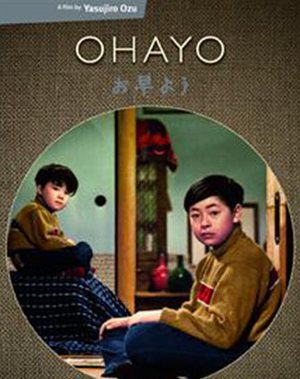
“Ohayo” (Good Morning, 1959), Ozu’s second film in color, is my favorite. It is, perhaps, his most American one, in some way resembling two episodes of a 1950s sitcom, not slow (clocking in at 94 minutes) and suffused with mono no aware. Both parts involve the diffusion of new technology: a washing machine and televisions.
The head of the Hayashi household, Ozu stalwart Ryû Chishû works for the gas company, He and housewife/mom (Miyae Kuniko) have their hands filled with petulant (or at least stubborn) grade-school-aged sons, Isamu (Shimazu Masahiko) and Minoru (Shitara Koji), who are the central characters of the second half of the movie.
In the first half, the neighborhood women’s association is missing some dues. The busybody Mrs. Tomizawa (Nagaoka Teruko) intimates that the association’s head, Mrs. Haraguchi (Sugimura Haruko), has embezzled funds so buy the first electric washing machine in the neighborhood. Mrs. Hayashi is the group’s treasure (and not a suspect). She tried to head off Mrs. Tomizawa’s suspicions, which (rightly) infuriate Mrs. Haraguchi.
Unaware of the conflict, the boys are believed to be snubbing the gossips when they stop greeting them. Their silent treatment (like the similarly young boys’ hunger strike in “I Was Born, But…“) is taken as snubs of the neighbors (notably the aggrieved injustice-collector Mrs. Haraguchi).

What has upset them is not their father’s cravenness to his work superiors as “I Was Born, But…”), but his refusal to buy them a television set. They have become big fans of sumo wrestling, viewed on a neighbor’s television set. Mr. Hayashi considers television an idiot box that makes its viewers idiots. He says the boys talk too much nonsense. They counter that adults talk too much nonsense (too) and go on a silence strike.
There is a sideplot involving their English tutor (Sada Keihi) and their aunt (mother’s sister Setsuko (Kuga Yoshiko), and the resolution of the son’s silence strike, buying a television, comes not from their antics but from compassion from their father for their older neighbor Tomizawa (Tono Eijirô), who has been let go (for drunkenness it seems) from his long-term (30 years) employer) and is selling tvs.

The fairly genial comedy calls attention to the deleterious effects of gossip (which forces the couple with the tv (who seem a generation younger than the Hayashis) that the boys watched to leave) as well as to the pains of the elderly neighbor let go, and to social changes in increasingly prosperous late-1950s Japan. It also includes bawdy farting on command between the Hayashi boys and Mrs. Haraguchi’s son Kozo (Shirata Hajime) ingesting pumice. The film ends with his washed-out underpants flapping on the clothesline.
©2016, Stephen O. Murray